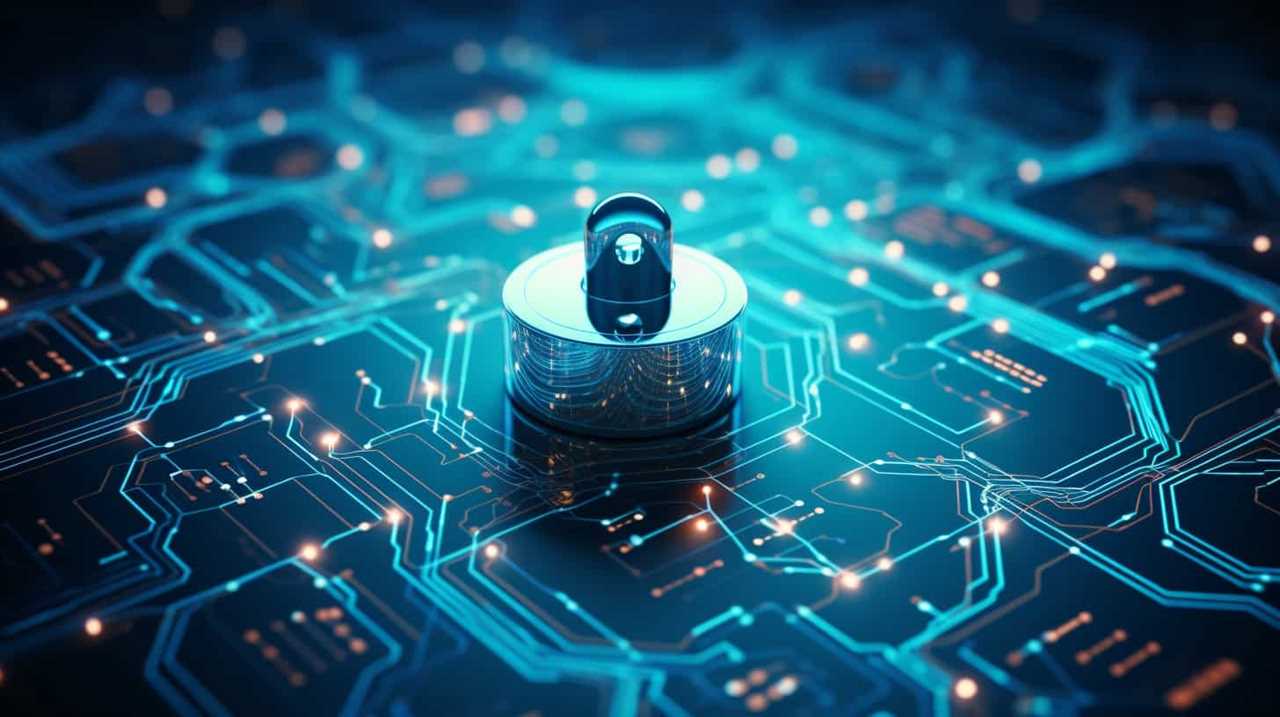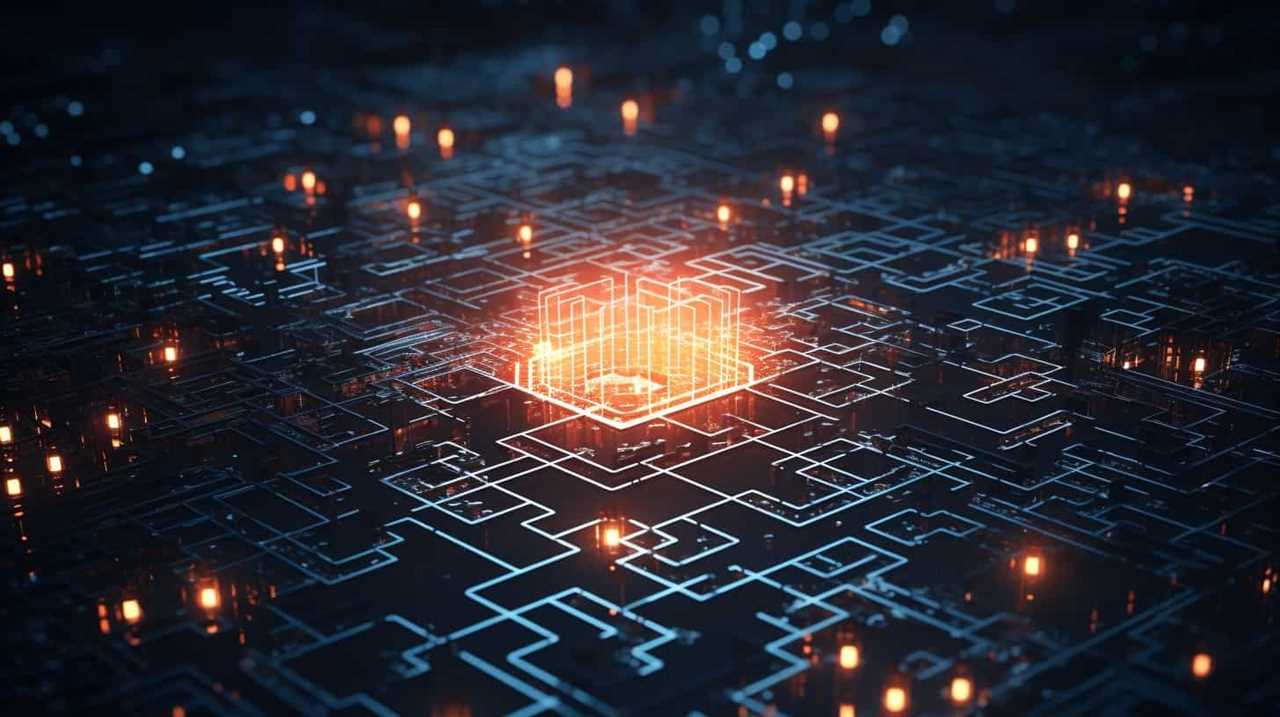As someone with a keen interest in AI security, I want to highlight the possible risks that could exist in your smart home devices. However, there is no need to worry! With the use of AI security technology, we can protect our private spaces and safeguard our homes from cyber threats.
In this article, we’ll delve into the growing importance of AI security, explore the risks associated with smart home devices, and discover how AI can enhance the protection of our beloved abodes.
Stay tuned for an insightful journey into the future of AI security in smart homes.
Key Takeaways
- AI security safeguards smart home devices from potential threats.
- Risks associated with smart home devices threaten privacy and security.
- AI security protects smart home devices and privacy.
- The future of AI security in smart homes is promising.

The Growing Importance of AI Security
The growing importance of AI security lies in its ability to safeguard smart home devices from potential threats. As technology advances and our reliance on smart home devices increases, so does the need for robust security measures.
AI plays a crucial role in addressing the security implications in various domains, including autonomous vehicles. With AI-powered systems, autonomous vehicles can detect and respond to potential cybersecurity threats in real-time, ensuring the safety of passengers and the integrity of the vehicle’s systems.
Moreover, AI itself can be both a tool and a target for cybersecurity threats. Attackers can exploit vulnerabilities in AI algorithms to manipulate systems and gain unauthorized access.
Understanding the risks associated with smart home devices is essential to ensure the protection of our privacy and security. Now, let’s delve deeper into the potential risks and vulnerabilities of these devices.

Understanding the Risks of Smart Home Devices
Often, I encounter risks associated with smart home devices that threaten my privacy and security. The convenience and automation these devices offer are accompanied by cybersecurity threats that cannot be overlooked. As technology advances, so do the methods used by hackers to exploit vulnerabilities in our smart home devices. From unauthorized access to personal data breaches, the risks associated with these devices are numerous. To emphasize the gravity of these risks, consider the following table:
| Risk | Impact | Prevention |
|---|---|---|
| Unauthorized Access | Compromised Privacy | Strong and unique passwords |
| Data Breaches | Identity Theft | Regular software updates |
| Malware Infections | Loss of Control | Secure Wi-Fi network |
| Lack of Encryption | Unauthorized Surveillance | Enable Two-Factor Authentication |
Understanding these risks is crucial in order to protect ourselves from potential harm. However, there is hope. AI security provides a solution by safeguarding our privacy and ensuring the integrity of our smart home devices.

How AI Security Safeguards Your Privacy
To safeguard my privacy, AI security plays a crucial role in protecting my smart home devices. With advanced AI algorithms and machine learning capabilities, AI security offers a range of benefits for privacy protection.
Here are five ways in which AI security safeguards my privacy:
- Intrusion detection: AI security systems can analyze network traffic and detect any unauthorized access attempts, ensuring that my smart home devices are protected from potential intruders.
- Behavior analysis: AI security can learn my behavioral patterns and identify any anomalies that may indicate a privacy breach, such as unusual device usage or unexpected data transfers.
- Vulnerability assessment: By continuously scanning my smart home devices for vulnerabilities, AI security can identify potential weak points and recommend necessary updates or patches to mitigate privacy risks.
- Data encryption: AI security employs encryption techniques to protect the data transmitted between my smart home devices and the cloud, ensuring that my personal information remains confidential and inaccessible to unauthorized parties.
- User authentication: AI security systems utilize biometric authentication methods, such as facial recognition or fingerprint scanning, to ensure that only authorized individuals can access my smart home devices and control their functionalities.
With these AI security measures in place, I can trust that my privacy is safeguarded while enjoying the convenience and connectivity that smart home devices offer.

Enhancing the Protection of Your Smart Home Network
As an AI security enthusiast, I can’t stress enough the importance of enhancing the protection of my smart home network. With the increasing number of connected devices in our homes, ensuring the security of our smart home network has become crucial.
One way to achieve this is by improving device compatibility. By ensuring that all devices in our network are compatible and updated with the latest security patches, we can minimize vulnerabilities and potential entry points for attackers.
Additionally, securing the IoT ecosystem is essential. This involves implementing strong encryption protocols, using secure communication channels, and regularly monitoring network traffic for any suspicious activity.

The Future of AI Security in Smart Homes
I am excited to explore the future of AI security in smart homes and how it will revolutionize the way we protect our connected devices. With advancements in artificial intelligence, we can expect significant improvements in the security of our smart homes. Here are some key aspects to consider:
- Enhanced threat detection: AI algorithms will continuously analyze data from various sensors and devices within our homes, enabling real-time identification of potential security breaches.
- Intelligent authentication: AI-powered systems can authenticate users based on multiple factors, such as biometrics, voice recognition, and behavioral patterns, making it harder for unauthorized individuals to gain access.
- Predictive analytics: AI can analyze patterns and detect anomalies, allowing for proactive measures to prevent security threats before they occur.
- Adaptive response: AI security systems can dynamically adapt to evolving threats and update security protocols accordingly.
- Ethical implications and regulatory frameworks: As AI security becomes more prevalent, we must carefully consider the ethical implications and establish regulatory frameworks to ensure the responsible and transparent use of AI technologies in our smart homes.
The future of AI security in smart homes holds great promise, but it also comes with the responsibility to address ethical concerns and establish robust regulatory frameworks. As we continue to embrace the advancements, we must strive for a balance between convenience, innovation, and the protection of our privacy and security.

Frequently Asked Questions
What Are Some Common Vulnerabilities in Smart Home Devices That AI Security Can Help Protect AgAInst?
Smart home devices have vulnerabilities that AI security can protect against. These vulnerabilities include weak passwords, outdated firmware, and unencrypted communications. AI security solutions can detect and mitigate these risks, ensuring the safety of your smart home.
How Does AI Security Specifically Safeguard the Privacy of Smart Home Device Users?
Safeguarding the privacy of smart home device users is crucial. Through user education, AI security enhances awareness of potential threats. Encryption plays a pivotal role in fortifying privacy, shielding personal data like an impenetrable fortress.
Are There Any Additional Steps Users Can Take to Enhance the Protection of Their Smart Home Network, in Addition to Utilizing AI Security?
Additional steps users can take to enhance the protection of their smart home network, other than utilizing AI security, include implementing strong passwords and two-factor authentication, regularly updating firmware and software, and disabling unnecessary features and services.
What Advancements or Developments Can We Expect to See in AI Security for Smart Homes in the Near Future?
In the near future, we can expect advancements in AI security for smart homes. These developments will have an impact on energy efficiency and integration with voice assistants, enhancing the overall protection of our devices.
Can AI Security Detect and Prevent Unauthorized Access to Smart Home Devices, Such as Hacking Attempts or Unauthorized Control?
Yes, AI security can detect and prevent unauthorized access to smart home devices. It uses advanced algorithms to monitor and analyze network traffic, identifying potential hacking attempts and unauthorized control. It safeguards user privacy by providing secure authentication and encryption protocols.

Conclusion
In conclusion, AI security plays a crucial role in safeguarding our smart home devices and protecting our privacy. By understanding the risks associated with these devices and implementing AI security measures, we can enhance the overall protection of our smart home network.
As technology advances, the future of AI security in smart homes holds promising potential. But, will you take the necessary steps to secure your smart home and ensure your peace of mind?









